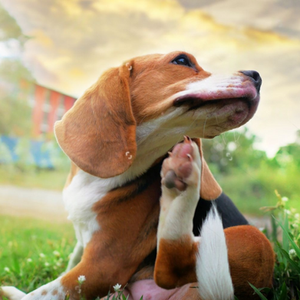Protect Your Pup’s Gut: 5 Hidden Toxins to Avoid During National Animal Poison Prevention Week
- Emanuela Visone
- Mar 18, 2025
- 4 min read

If your dog struggles with Irritable Bowel Syndrome (IBS), you’ve likely spent a lot of time adjusting their diet like I did with Sonnie, removing problem foods, choosing gut-friendly proteins, and maybe even adding probiotics. But did you know that hidden toxins in your home could also be triggering your dog’s digestive distress?
Many common household products contain chemicals, artificial sweeteners, and plant toxins that can irritate your dog's gut, trigger inflammation, and worsen IBS symptoms. Dogs, like humans, are highly sensitive to their environment—and toxins they ingest, inhale, or absorb through their paws can lead to chronic gut issues, diarrhea, vomiting, and bloating.
Let’s explore 5 common household toxins that could be harming your dog’s digestive health, and
gut-safe swaps to help reduce their toxic load.
1. Xylitol (in Sugar-Free Gum, Mints, & Baked Goods)

How It Harms Your Dog’s Digestion:
Xylitol is a common sugar substitute found in sugar-free gum, mints, peanut butter, and even some packaged dog treats. While it’s marketed as a healthier alternative to sugar for humans, it is highly toxic to dogs—even in small amounts.
❌ Hypoglycemia (Dangerously Low Blood Sugar): Xylitol causes a massive insulin spike in dogs, leading to a sudden drop in blood sugar. This can cause vomiting, lethargy, seizures, and even death.
❌ Gut Stress & Liver Damage: Xylitol can rapidly stress the digestive system, triggering inflammation in the liver and intestines, which worsens IBS symptoms in dogs.
Gut-Safe Swap:
✅ Always check ingredient labels for xylitol before giving your dog peanut butter, yogurt, or treats. Replace dairy yogurt with raw goat kefir or yogurt and replace peanut butter with raw almond butter.
✅ Use natural dog-friendly sweeteners like pumpkin puree or honey (in small amounts).
2. Chemical Cleaning Products (Bleach, Ammonia, & Artificial Fragrances)

How They Harm Your Dog’s Digestion:
Most commercial cleaning products contain harsh chemicals, synthetic fragrances, and volatile organic compounds (VOCs) that dogs inhale or absorb through their paws.
❌ Irritates the Gut Lining: If your dog licks floors, food bowls, or toys cleaned with chemical-laden products, it can lead to stomach irritation, vomiting, and diarrhea.
❌ Disrupts Gut Bacteria: Chemical exposure damages gut microbiota, increasing inflammation and making it harder for your dog to digest food properly.
Gut-Safe Swap:
✅ Switch to natural, pet-safe cleaners like vinegar, baking soda, and unscented castile soap.
✅ Look for pet-friendly cleaning brands like Seventh Generation (fragrance-free).
3. Toxic Houseplants (Lilies, Sago Palm, & Pothos)

How They Harm Your Dog’s Digestion:
Many popular houseplants contain toxins that cause severe digestive upset in dogs if ingested.
❌ Sago Palm: Highly toxic! Ingesting even a small amount can cause vomiting, diarrhea, liver failure, and even death.
❌ Lilies: While more dangerous for cats, some lily varieties can cause nausea, vomiting, and stomach irritation in dogs.
❌ Pothos (Devil’s Ivy): Contains calcium oxalate crystals, which cause oral irritation, excessive drooling, and digestive distress.
Gut-Safe Swap:
✅ Choose pet-safe plants like Boston ferns, spider plants, or areca palms.
✅ Keep toxic plants out of reach or remove them entirely if your dog likes to nibble on leaves.
4. BPA & Plastics in Food Bowls & Water Containers

How It Harms Your Dog’s Digestion:
Bisphenol A (BPA) is a hormone-disrupting chemical found in plastic food bowls, water dispensers, and even canned dog food linings.
❌ Causes Gut Inflammation: BPA alters gut microbiota, leading to chronic digestive distress, bloating, and loose stools.
❌ Hormonal Imbalances: Because BPA mimics estrogen, it can disrupt thyroid function, slowing metabolism and affecting digestion.
Gut-Safe Swap:
✅ Use stainless steel, ceramic, or BPA-free silicone bowls for food and water.
✅ Choose BPA-free canned dog food or opt for fresh or freeze-dried dog food.
5. Artificial Air Fresheners & Scented Candles

How They Harm Your Dog’s Digestion:
Many air fresheners, plug-ins, and scented candles contain phthalates, synthetic fragrances, and formaldehyde, which can harm your dog’s respiratory system and gut health.
❌ Toxic Fumes: Dogs have a far more sensitive sense of smell than humans, and artificial scents can irritate their airways and digestive tract.
❌ Vagal Nerve Stimulation: Certain synthetic fragrances overstimulate the vagus nerve, which connects the gut and brain. This can trigger nausea, bloating, and discomfort in dogs with IBS.
Gut-Safe Swap:
✅ Use essential oil diffusers with lavender, peppermint, or chamomile (safe in small amounts for dogs).
✅ Choose soy-based or beeswax candles scented with pure essential oils.
Checklist: Gut-Safe Swaps for a Healthier Home for Your Dog
✔ Ditch xylitol-containing foods → Choose natural dog-friendly treats
✔ Replace chemical cleaners → Use pet-safe vinegar and castile soap
✔ Swap toxic houseplants → Choose ferns, spider plants, and areca palms
✔ Avoid plastic food bowls → Use stainless steel or ceramic
✔ Eliminate artificial air fresheners → Diffuse essential oils or use unscented beeswax candles
Final Thoughts: Reduce Your Dog’s Toxic Load for a Happier Gut
Many dog parents focus on food sensitivities when managing IBS in dogs, but environmental toxins can be just as damaging. Reducing exposure to harmful chemicals, artificial sweeteners, and hormone-disrupting plastics can help support digestion, improve gut health, and reduce IBS symptoms.
Start small—swap one or two items at a time and observe any changes in your dog’s digestion, energy, and overall well-being.
Have you noticed any IBS improvements after making changes to the home environment? Let me know in the comments! 🐶🌿✨








Comments